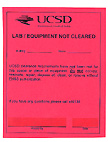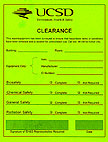Decontamination Clearance for Equipment or Facilities
Learn how to get decontamination clearance for research equipment and facilities.
Decontamination clearance surveys
Environment, Health & Safety (EH&S) performs clearance surveys to confirm research equipment and facilities are decontaminated and free of hazardous materials.
Use the Decontamination Clearance Request to request a clearance survey.
Requirement for Labs
- Equipment that may have come in contact with radioactive, biohazardous, or chemical materials must be decontaminated before service, repair, move, or disposal. Requests must be made 5 business days in advance. For urgent requests that require an expedited site visit, please provide justification in the comments section.
- The following departments are approved to perform equipment clearance requests internally through their Department Safety Office. Please contact your DSO by email with the request and copy your RAP contact on the email.
- Biology
- Chemistry
- SIO
- Bioengineering
- of Medicine
- Nanoengineering
Follow the steps below to get decontamination clearance.
Biohazardous materials
Decontaminate
Decontaminate equipment with a biohazard label, that may have been in contact with biohazardous material, or was used in a BSL-2 or BSL-3 lab.
Biosafety cabinets (BSC)
- If the BSC is not being moved and repair work will not open the contaminated inner space, a surface decontamination with an appropriate disinfectant and contact time is sufficient.
- If a BSC is to be moved, do the following:
- Contact Biosafety staff, ehsbio@ucsd.edu, to determine if the new location is acceptable.
- Have the BSC gas-decontaminated by an approved vendor. In some instances, a surface decontamination with an approved disinfectant and contact time may be sufficient if the following conditions apply:
- The current owner knows the history of the cabinet and can say that no human infectious agents (risk group 2) were used. This would include blood, body fluids, and cell cultures that are known to contain human infectious agents. If the current owner was not the purchaser of the cabinet, confirmation of historical use will be needed from previous owners.
- The biosafety cabinet is NOT being transferred to another institution, another UC San Diego investigator, or to Surplus Sales.
- The biosafety cabinet is NOT in a BSL-3 laboratory
- If the cabinet is surface decontaminated, the sash opening must be taped closed with plastic film or sheeting.
- Move biosafety cabinets carefully to ensure structural integrity. Required:
- Use a qualified lab equipment mover, such as Moving Services, to move this type of laboratory equipment.
- A mechanical device like a pallet jack must be used to move the cabinet.
- Have the BSC recertified after it has been installed in a new location. Exceptions to this may be granted if the cabinet is moved within the same room and no human infectious agents (risk group 2) were used. EH&S staff must observe relocation in these instances.
Other equipment
- Clean the item by using a disinfectant and contact time known to be effective for the infectious agents contaminating the equipment.
- If equipment includes a freezer, follow instructions for properly defrosting a research freezer (PDF).
- See Summary of Disinfectants (PDF) (Excel) for recommended disinfectants, their uses, and requirements.
- Read Biosafety: Decontamination Methods for Laboratory Use for more information.
- If you have questions about appropriate decontamination procedures, contact the EH&S Research Assistance Program specialist for your building.
Request decontamination clearance
- Use the Decontamination Clearance Request to request a clearance survey.
Items are considered free of biohazardous material and additional requirements and controls when an EH&S specialist:
- Verifies the item has been disinfected
- Removes the Biohazard symbol and labels
- Attaches a Clearance label to the item
Hazardous chemicals
Decontaminate
Decontaminate equipment that may have been in contact with a hazardous chemical material.
- If equipment includes a freezer, follow instructions for properly defrosting a research freezer (PDF).
- Wash or wipe away any visible chemical contamination.
- If perchloric acid has been used in the chemical fume hood, notify the Chemical Hygiene Officer.
Request decontamination clearance
- Use the Decontamination Clearance Request to request a clearance survey.
Items are considered free of chemical hazards when an EH&S specialist attaches a Clearance label to the item.
Radioactive materials
Decontaminate
Decontaminate equipment with a radioactive material label or that may have been in contact with radioactive material.
- Clean the item so it's free of all unassociated material (e.g., labware and chemicals found in refrigerators, freezers, fume hoods, etc.).
- If equipment includes a freezer, follow instructions for properly defrosting a research freezer (PDF).
- Survey the item using a radiation survey meter and wipes.
Request decontamination clearance
When the item has been decontaminated to background radiation level, request decontamination clearance.
- Use the Decontamination Clearance Request to request a clearance survey.
Items are considered free of radioactive material when an EH&S specialist:
- Removes Radioactive Material labels
- Attaches a Clearance label to the item
Facility clearance

Request decontamination clearance
- Use the Decontamination Clearance Request form to have EH&S perform a clearance survey.
Red tag
EH&S posts a red tag when researchers vacate a lab to indicate decontamination and clearance procedures have begun in the facility. A red tag will still allow custodians to enter and empty regular trash.
Green tag

EH&S posts a green clearance tag after hazards are removed, indicating the facility is safe for contractors and other non-laboratory service personnel to enter and begin work.
Non-lab personnel instructions
Provide contractors and other non-laboratory personnel performing work in research space with a copy of Guidelines for Non-laboratory Personnel Working in UC San Diego Laboratories.